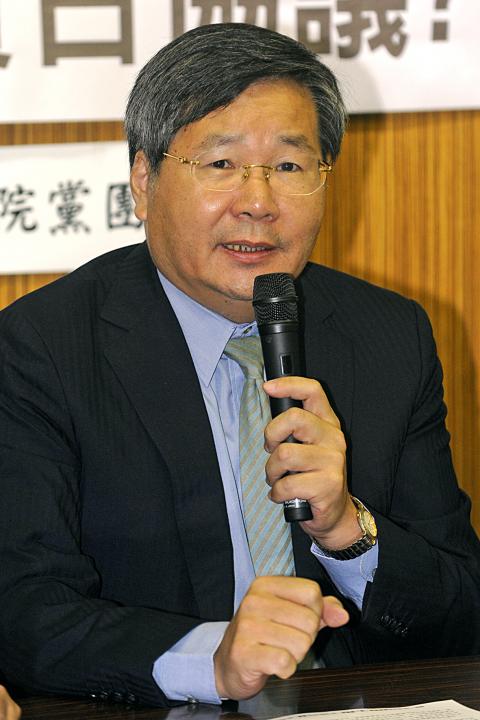Academics yesterday urged caution toward Beijing’s relaxation of restrictions on Taiwan-based businesses, citing political and business risks, as well as its potential to drain Taiwan’s capital and talent.
China’s Taiwan Affairs Office (TAO) on Wednesday announced that many restrictions on the licensing of privately or individually owned Taiwanese businesses are to be lifted next year.
Previously, Chinese authorities only permitted Taiwanese-owned businesses from the retail and restaurant industries to operate in China, but the new rules are to permit privately owned businesses from 24 different industries, including advertising and packaging services, the TAO said.

Photo: Chen Chih-chu, Taipei Times
The area in which Taiwanese businesses are allowed to operate will be drastically expanded from nine provinces and cities to almost all of China, excluding Xinjiang, Gansu and Qinghai provinces, as well as Inner Mongolia and Tibet, the TAO said, adding that Taiwanese businesses would also no longer be limited to having a maximum of 10 employees and 500m2 of business space.
National Cheng Kung University law professor Hsu Chun-hsin (許忠信), who is a former legislator of the Taiwan Solidarity Union, said the lifting of restrictions is a Chinese strategy to drain Taiwan’s small and medium businesses of capital and talent.
The policy is also an alternative to the trade in service and goods agreements, whose future had been called into question by the public backlash against it, Hsu said.
“While many will be tempted to start businesses in China, my experience as a lawmaker made me familiar with many cases of Taiwanese entrepreneurs who were blindsided by hostile takeovers and lost everything,” he said. “Private operators are no doubt even less protected than their predecessors.”
National Central University economics professor Chiou Jiunn-rong (邱俊榮) was also reserved about the announcement, saying: “The yielding of benefits is only superficial.”
Only the most well-connected Taiwanese corporations could gain direct access to customers in China, and those customers consist almost entirely of major Chinese corporations, he said, adding that the announcement is “an attempt to influence the coming election.”
Economic Democracy Union convener Lai Chung-chiang (賴中強) warned that the lifting of restrictions is a reaction to the stonewalling of the trade in service and goods agreements by the legislature, designed to drain Taiwan’s talent and capital while increasing dependence.
It is also possible that China intends to utilize Taiwanese capital and talent for its own “One Belt, One Road” project, Lai said.
“China is a highly volatile investment environment due to its justice system, tax codes and investment management practices,” he said, adding that Taiwanese business owners frequently lose their enterprises, or even their freedom, in China.
“The promotion of the market is the cause of Taiwan’s current economic woes … the government should take measures to prevent more of Taiwan’s technological advantages from falling into Chinese hands,” Democratic Progressive Party Legislator Lee Chun-yi (李俊俋) said.

Seventy percent of middle and elementary schools now conduct English classes entirely in English, the Ministry of Education said, as it encourages schools nationwide to adopt this practice Minister of Education (MOE) Cheng Ying-yao (鄭英耀) is scheduled to present a report on the government’s bilingual education policy to the Legislative Yuan’s Education and Culture Committee today. The report would outline strategies aimed at expanding access to education, reducing regional disparities and improving talent cultivation. Implementation of bilingual education policies has varied across local governments, occasionally drawing public criticism. For example, some schools have required teachers of non-English subjects to pass English proficiency

‘FORM OF PROTEST’: The German Institute Taipei said it was ‘shocked’ to see Nazi symbolism used in connection with political aims as it condemned the incident Sung Chien-liang (宋建樑), who led efforts to recall Democratic Progressive Party (DPP) Legislator Lee Kun-cheng (李坤城), was released on bail of NT$80,000 yesterday amid an outcry over a Nazi armband he wore to questioning the night before. Sung arrived at the New Taipei City District Prosecutors’ Office for questioning in a recall petition forgery case on Tuesday night wearing a red armband bearing a swastika, carrying a copy of Adolf Hitler’s Mein Kampf and giving a Nazi salute. Sung left the building at 1:15am without the armband and apparently covering the book with a coat. This is a serious international scandal and Chinese

TRADE: The premier pledged safeguards on ‘Made in Taiwan’ labeling, anti-dumping measures and stricter export controls to strengthen its position in trade talks Products labeled “made in Taiwan” must be genuinely made in Taiwan, Premier Cho Jung-tai (卓榮泰) said yesterday, vowing to enforce strict safeguards against “origin laundering” and initiate anti-dumping investigations to prevent China dumping its products in Taiwan. Cho made the remarks in a discussion session with representatives from industries in Kaohsiung. In response to the US government’s recent announcement of “reciprocal” tariffs on its trading partners, President William Lai (賴清德) and Cho last week began a series of consultations with industry leaders nationwide to gather feedback and address concerns. Taiwanese and US officials held a videoconference on Friday evening to discuss the

PERSONAL DATA: The implicated KMT members allegedly compiled their petitions by copying names from party lists without the consent of the people concerned Judicial authorities searched six locations yesterday and questioned six people, including one elderly Chinese Nationalist Party (KMT) member and five KMT Youth League associates, about alleged signature forgery and fraud relating to their recall efforts against two Democratic Progressive Party (DPP) legislators. After launching a probe into alleged signature forgery and related fraud in the KMT’s recall effort, prosecutors received a number of complaints, including about one petition that had 1,748 signatures of voters whose family members said they had already passed away, and also voters who said they did not approve the use of their name, Taipei Deputy Chief Prosecutor